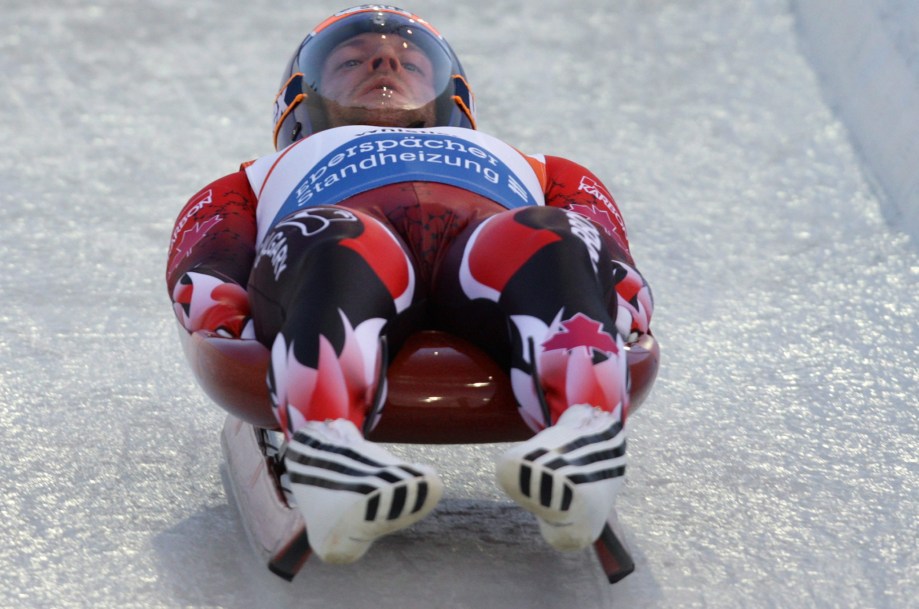Ian Cockerline's Life of Luge
The Highs, Lows and Uncertainties in a Life Devoted to Sport
Turin, Italy, February 12, 2006: The fourth and final luge run at the Olympic Winter Games. Calgary’s Ian Cockerline had been racing well. He was 13th after two races and 16th after the third. The chance to be top Canadian and even crack the top-10 was possible, two things he had never done in his career.
“I thought, ‘Wow I can do this,'” Cockerline said. “That’s why I tried as hard as I did on the fourth run. Maybe a little too hard.”
On the second-last curve Cockerline turned aggressively. Then, just like a car on ice, his sled started to skid. While he fought to correct the skid, he felt time slow down. And in a heartbeat, time went fast: his body flew off the skidding sled. With that, his Olympic hopes were dashed. “It was a heart-wrenching experience,” he said.
After his spectacular crash, Cockerline had to hoist himself over the railing and walk through the crowd, sled on his head, to the finish dock. Fans were cheering, asking for photos and autographs, as most had never seen a luge crash before and were amazed he was okay. The Calgarian did his best to be friendly. “I’m sure there are a few pictures of me out there trying hard to smile.”
When Cockerline was eight, his father saw a “Discover Luge” ad in the newspaper. Cockerline, who loved roller coasters, took a natural affinity to it. By age 12, he was participating full-time in the Calgary luge program.
“No one is a natural at luge,” he said. “You have to work very hard at it. But I loved it.”
Since 2003, he has travelled the world with the national team, dedicating his life to a sport well off the radar of most Canadians. “I think of (luge) as tobogganing for adults – It’s like a serious, serious toboggan race,” Cockerline said, adding that steering the sled takes considerable skill. He knows that Canadian fans focus on bigger sports, like hockey. “I’m a big Flames fan, I understand that. But they forget there are a lot of other sports that have a real Canadian flavour in them.”
His Olympic experience in 2006 was impactful in a few ways. Until then he hadn’t posted any serious results and would typically finish behind his teammates – and very close friends – Jeff Christie and Sam Edney. In fact, Cockerline usually had to qualify to make the team, fending off challenges from Canada’s up-and-coming luge athletes. But Turin “woke him up” to his own potential.
Two years later in Oberhof, Germany, he hit a career mark by finishing 15th at the World Championships. That season he also came in 14th at a World Cup in his hometown, matching his best-ever finish (also in Calgary).
Now all sights are set on the 2010 Olympic Winter Games. The luge team is well-versed already with the track in Whistler, with about 200 runs in the bank for each of them. Such practice helps make the athletes more comfortable and able to risk a little more for the sake of speed.
“(The Games are) such a great opportunity to showcase a sport that isn’t so popular in North America,” Cockerline said. Since it’s in Canada, friends and family will be watching live. “It’s almost a reward for them for sticking around and supporting us all these years.”
The Games may truly help propel luge from the shadows. Demand far exceeded supply for tickets at a sold-out World Cup in Whistler this year, with tickets going for well above face value. This was very unusual, even in Germany. “Whistler is going to turn into a pretty interesting stop on the World Cup circuit,” he said. “I can only imagine what the Olympics will be like out there. It will be wild.”
It may be Cockerline’s last Olympic Winter Games, but he isn’t quite sure. The thought of post-athletics is an unsettling one for him.
“It’s actually really scary to think of how much education I’ve put on hold,” he said. “You don’t make a ton of money as a Canadian athlete. You think, now I’m 25, is this my last Olympics, am I going to go to school full time now, back with 18-year-olds in Psych 201? It’s a scary thought for me. I think about it every day of my life.
“But at the same time there is nothing I’d rather be doing. I love the sport and I love the people I hang around. I wish I could afford to do this forever.”




